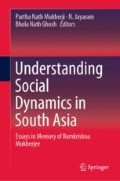Abstract
Contemporary India stands on the threshold of a knowledge society that is widely characterized by phenomenal penetration of information and communication technologies (ICTs), neo-liberal economic globalisation, use of knowledge and education in all domains of lives, shift in workforce from agriculture and industry to service sector, as well as the ushering of new socio-cultural forms. However, in rural areas, the advancement of knowledge society has been limited because of spatial segregation between rural and urban areas, as well as social segregation in terms of caste, gender, ethnicity and class. In this chapter, we show that a higher social and economic status has remained positively linked with a higher degree of association with the knowledge society. However, regardless of this unevenness, the knowledge society has led to a new economic and socio-cultural momentum through the use of ICTs, which has produced newer patterns of spatial and occupational mobility.
Access this chapter
Tax calculation will be finalised at checkout
Purchases are for personal use only
Notes
- 1.
These statistics were cited from http://www.internetworldstats.com/stats.htm (accessed 25 September 2016) and http://trak.in/tags/business/2016/05/31/indian-mobile-subscriber-stats-mar-2016/ (accessed 25 September 2016).
References
Black, A. 2003. The information society: A secular view. In Challenge and change in the information society, ed. Susan Hornby and Zoë Clarke, 18–41. London: Facet.
Castells, M. 1997. The rise of the network of society. Oxford: Blackwell.
Castells, M. 2001. The internet galaxy: Reflections on the internet, business, and society. Oxford: Oxford University Press.
Deane, P. 1980. The first industrial revolution. Cambridge: Cambridge University Press.
Drucker, P.F. 1968. The age of discontinuity: Guidelines to our changing society. London: Heinemann.
Giddens, A. 1991. Modernity and self-identity. Cambridge: Polity Press.
Government of India. 2014. Economic survey. New Delhi: Department of Economic Affairs, Ministry of Finance.
Machlup, F. 1962. The production and distribution of knowledge in the United States. Princeton, NJ: Princeton University Press.
Masuda, Y. 1990. Managing in the information society: Releasing synergy Japanese-style. Oxford: Basil Blackwell.
McDonald, K. 2002. From solidarity to fluidarity: Social movements beyond collective identity—The case of globalisation of conflict. Social Movement Studies 1 (2): 109–128.
Melucci, A. 1996. Challenging codes: Collective action in the information age. Cambridge: Cambridge University Press.
Muddiman, D. 2003. World gone wrong? Alternative conceptions of the information society. In Challenge and change in the information society, ed. Susan Hornby and Zoë Clarke, 42–59. London: Facet.
National Sample Survey Organisation. 2012. Employment and unemployment and migration survey—64th round. New Delhi: Ministry of Statistics and Programme Implementation, Government of India.
Planning Commission. 2001. India: Knowledge super power—Strategy for transformation (Task force report). New Delhi: Government of India.
Toffler, A. 1970. Future shock. New York: Random House.
Toffler, A. 1980. The third wave. London: Pan Books.
Toffler, A. 1990. Power shift: Knowledge, wealth and violence at the edge of the 21st century. New York: Bantam Books.
Toffler, A., and H. Toffler. 1995. Creating a new civilisation: The politics of the third wave. Atlanta: Turner Publishing.
Touraine, A. 1981. The voice and the eye: An analysis of social movements. Cambridge: Cambridge University Press.
United Nations Organisation. 2005: Understanding knowledge societies. New York: Department of Economic and Social Affairs, Division for Public Administration and Development Management.
University Grants Commission. 2013. Higher education at a glance. New Delhi: University Grants Commission. Available at http://www.ugc.ac.in/pdfnews/6805988_HEglance2013.pdf. Accessed 16 Oct 2013.
Urry, J. 2000. The importance of social movements. Social Movement Studies 1 (1): 185–203.
van Dijk, Jan A.G.M. 1999. The network society: Social aspects of new media. London: Sage Publications.
Author information
Authors and Affiliations
Corresponding author
Editor information
Editors and Affiliations
Rights and permissions
Copyright information
© 2019 Springer Nature Singapore Pte Ltd.
About this chapter
Cite this chapter
SinghaRoy, D.K. (2019). Dynamics of Social Mobility in an Emerging Knowledge Society: The Case of Rural India. In: Mukherji, P., Jayaram, N., Ghosh, B. (eds) Understanding Social Dynamics in South Asia. Springer, Singapore. https://doi.org/10.1007/978-981-13-0387-6_7
Download citation
DOI: https://doi.org/10.1007/978-981-13-0387-6_7
Published:
Publisher Name: Springer, Singapore
Print ISBN: 978-981-13-0386-9
Online ISBN: 978-981-13-0387-6
eBook Packages: Social SciencesSocial Sciences (R0)

